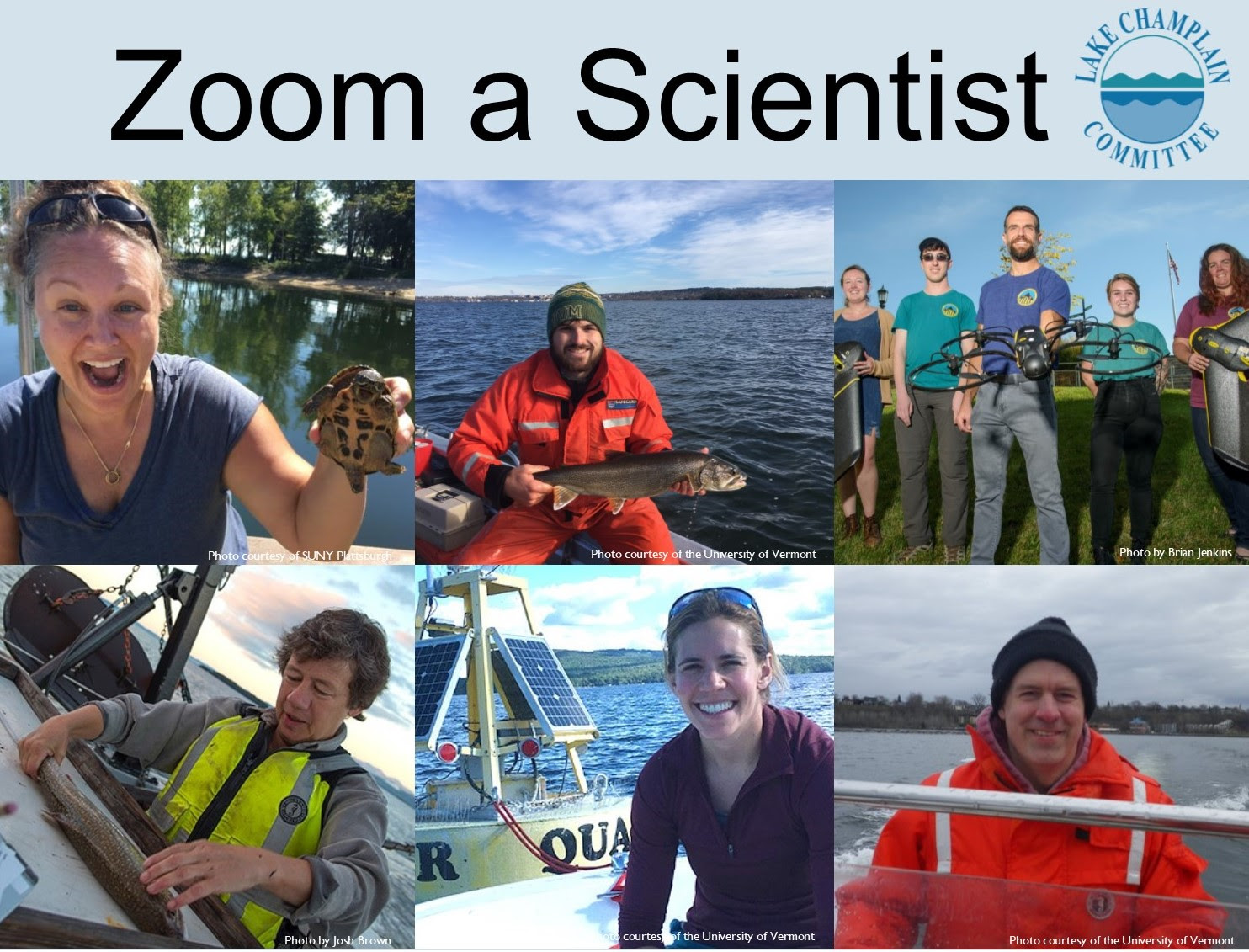
Lake Champlain Committee
We hope you’re healthy and finding ways to nurture yourself during these challenging times. We are looking forward to diving into the lake to refresh our spirits once temperatures warm and travel restrictions ease. In the meantime, we thought we’d share the expanded line up of “Zoom a Scientist” programs that our friends at Lake Champlain Sea Grant have put together. You can tune in virtually through Zoom every Tuesday and Friday from noon to 1:00 p.m. to learn more about the lake! Click on the links in the write-ups below to register.
Take good care,
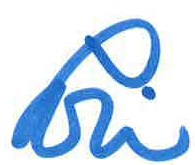
Lori Fisher, LCC Exec. Director
April 17 – Climate Change in the Lake Champlain Basin: What’s Already Happened and Where We’re Headed
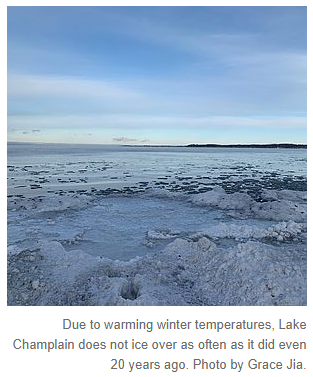
We often think about climate change as a distant consequence of today’s actions, but climate change is here and we are already experiencing the impacts. Climatologist Dr. Eric Leibensperger of the State University of New York at Plattsburgh will highlight changes that have already been observed and others that are projected to occur in the Champlain Valley.
April 21 – A Fish’s Story: Following Lake Trout Movement around Lake Champlain
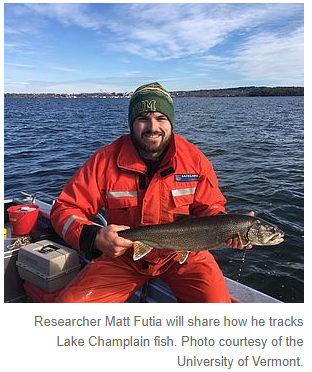
Studying aquatic organisms can present challenges due to limits in direct observation. University of Vermont Master of Science Candidate Matt Futia will lead us through some technological advances that enable scientists to track individual fish to understand their movement across time. Learn what technologies are being employed and how they help us understand how Lake Champlain fish behave and use the resource.
April 24 – Microplastics in Freshwater Systems
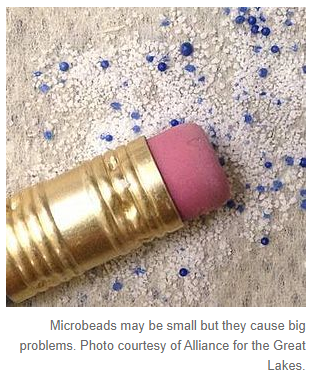
Numerous studies document the physical and toxicological effects of plastic in the environment. Microplastics—those tiny plastic fragments of less than 5 mm in length—are of particular concern because they have the potential to be ingested by a much wider range of organisms than large plastic debris, making them and the chemicals they carry bioavailable throughout the food chain. Dr. Danielle Garneau has analyzed Lake Champlain wastewater treatment effluent for microplastics and mapped microplastic distribution in the lake’s zooplankton. She’ll share findings from her research and some thoughts on what can be done to address the problem.
April 28 – Long-term Effects of Climate Change on Lakes and the Importance of Winter Sampling
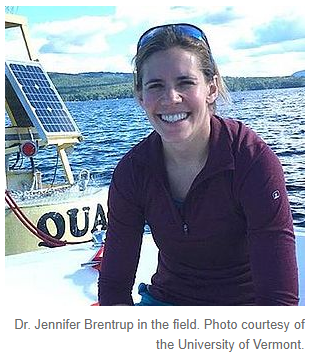
This episode looks at some of the research summarizing the effects of climate change and extreme events on lakes. What are some of the effects of climate change and extreme events on lakes? What happens to lakes during winter and why do most scientists only sample lakes in the summer? University of Vermont Limnologist Dr. Jennifer Brentrup will discuss some long-term studies on lakes and why sampling lakes year-round, especially under-ice, is becoming increasingly important. Learn how dissolved oxygen levels are used to estimate lake metabolism under-ice and other neat research methods.
May 1 – Sensing What is in the Water: Next-generation Sensor Technologies for Water Quality Monitoring
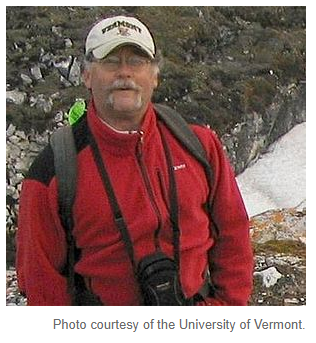
Lake Champlain Sea Grant’s Director Dr. Breck Bowden will review how researchers measure water quality, traditional sampling methods, and how new technologies are providing new insights. He’ll talk about the both the challenges and emerging opportunities that sensor technologies provide for water quality monitoring.
May 5 – But How Do We Know? Sampling Fish to Understand What’s Happening with Populations

Water is an alien habitat for humans; most information about fish is collected by remotely sampling (bringing fish to the surface to study). How do scientists use those samples of fish to understand whether fish populations are healthy? Are they increasing or decreasing in abundance? How do we interpret the data from a few fish to a whole lake? What new methods are being developed for observing fish? University of Vermont Fisheries Biologist Dr. Ellen Marsden will help answer these and other questions about current fisheries research on Lake Champlain.
May 8 – Squeezing the Middle of Lake Champlain’s Food Web
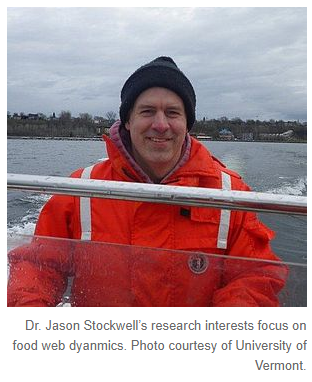
The recent surge in natural reproduction by lake trout is a success story, but can too much success be a bad thing? UVM Rubenstein Ecosystem Science Laboratory’s Director, Dr. Jason Stockwell research explores the interaction of lake trout natural reproduction and lake trout stocking strategies to evaluate if too many lake trout mouths will be too much for prey fish populations. How might the potential for a quagga mussel invasion effect food web energy and shunt production to the bottom of the lake.
May 12 – Mapping our Streams and Lakes With Drones

You have likely seen a drone fly by and maybe you even own one to take pictures or shoot video, but did you know we can also use drone technology for mapping and monitoring our streams and lakes? Jarlath O’Neil-Dunne, Director of the University of Vermont’s Spatial Analysis Laboratory, will share how drones are being used to map invasive species, respond to floods, and track changes in streams in the Lake Champlain watershed.
New Address or Email?

LCC mail is being forwarded to LCC’s Executive Director’s home while we work remotely and follow “stay at home” orders to slow the Covid-19 infection. Your mail will still get to us so please keep those envelopes coming! Help us stay connected to you during this time of physical distancing by emailing us any changes to your mailing or email addresses. Thanks for keeping in touch!
Lake Champlain Committee Board of Directors
Gary Kjelleren – Chair (South Hero, VT), Sandy Montgomery – Treasurer (Montreal, QC), Alan Booth (Plattsburgh, NY), Cliff Landesman (Brooklyn, NY), Jess Phelps (Northfield, VT), Ann Ruzow Holland (Willsboro, NY), Hank Slauson (Shelburne, VT), Chuck Woessner (Grand Isle, VT).
Lake Champlain Committee Advisory Council
Lisa Borre (Annapolis, MD), Megan Epler Wood (Burlington, VT), Steven Kellogg (Essex, NY), Peter S. Paine Jr. (Willsboro, NY), Bob Paquin (Shelburne, VT), Mary Watzin (NC).
Staff & Support
Lori Fisher, Executive Director
Alexa Hachigian, Field Associate/Office Manager
Lauren Sopher, Director of Science and Water Programs
Jared Carpenter, Water Protection Advocate
Grace Jia, ECO AmeriCorps Education and Outreach Coordinator
LCC Links
Join LCC as a new member
Renew your LCC membership
Donate to LCC
Like LCC on Facebook!
Do you enjoy clean and accessible water?
Like the Lake Champlain Committee on Facebook, or click the button below, to get the most up to date information on water quality infrastructure and legislature both near and far!
Copyright © 2020 Lake Champlain Committee, All rights reserved.
You have received this message because you are subscribed to receive emails from the Lake Champlain Committee. We’ll send about 1-2 emails per month.
Our mailing address is:
Lake Champlain Committee208 Flynn Ave Bldg 3Studio 3fBurlington, VT 05401-5429

